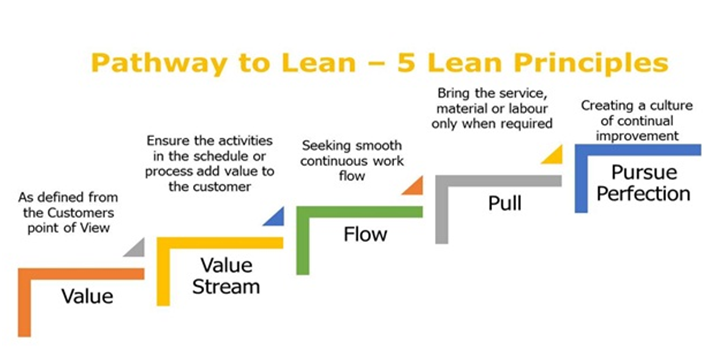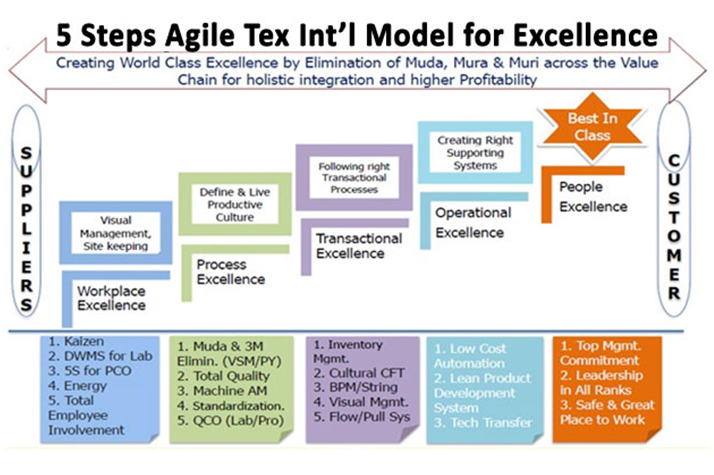Lean Manufacturing & Production Agile Tex International
Lean Manufacturing or Lean Production
Lean Manufacturing or Lean Production, often simply "Lean", is a systematic method for the elimination of waste ("Muda") within a manufacturing system. Lean also takes into account waste created through overburden ("Muri") and waste created through unevenness in workloads ("Mura").
Lean Manufacturing is a ''way to design systems to minimize waste of materials, time, and effort in order to generate the maximum possible amount of value to customer''. It is the process of eliminating waste with the goal of creating ''value''. The philosophy of Lean provides the tools to release wasted time augmented with the insights of a structured process.
Value is defined as 'what the customer is actually willing to ''pay'' for i.e. usefulness or cost:
- Includes Functions, Features, Time & Price
- Relates to the whole product or service received
- Is the opposite of ''waste''
Shoichiro Toyoda, President, Toyota defined waste, ''anything other than the minimum amount of equipment, materials, parts, space, and worker's time, which are absolutely essential to add value to the product.''
The implementation of Lean Manufacturing yields numerous changes in manufacturing approach of any industry. Its principal implications are
- Mass Manufacturing/ Batch production methods are replaced with One Piece or Single Piece Flow method
- Rather than pushing, information & materials are pulled to flow throughout value stream based on customer demand
- WIP inventory get reduced since there's lesser material waiting to be processed
Quality approvals get eliminated since inspection becomes an integral part of the production process

How ATI can help you implement Lean Manufacturing!
To understand and implement the Lean Manufacturing principles, a paradigm shift is a must. Lean thinking facilitates this shift. Many tenets of traditional businesses get turned on their heads. These include operational issues such as, top-down hierarchy works best, dependence on individuals and not the system, clear roles and responsibilities are not required when figures are achieved, improved quality means increase in cost, building excess inventory is alright, training is a waste of time and so on.
Our Lean Consultants organize Gemba Kaizen Workshops for training and implementation of Lean Manufacturing tools & techniques. Our workshops comprise of Cross-functional team members and involves diversity. By encouraging and bringing people together to exchange of ideas freely, we enable the decision making process. We challenge the conventional method of working to drive individual behavior by coaching them for performance. Such culture building and problem solving exercises bring insights, facts, helps identify options and creates alternative to challenge the underlying assumptions at each level and reflects the imperfections that the system has in the form of process waste. The traditional manufacturing approaches characterized by use of economic order quantities, high capacity utilization, and high inventory pave way for scheduled deliveries based on shared forecast producing make-to-order with quick changeover.
ATI's Lean Manufacturing Consultants pool resources, experiences and competencies to generate powerful results.
We, at ATI, are committed to an early and total eradication of all wasteful practices at the client's. We focus on making improvements by finding solutions to chronic issues of the organization. We hand-hold the clients with the commitment to help achieve the set targets, in finding solutions for them through empowered team work, and streamlining processes with impeccable systems in place to make the processes self-regulated, efficient and effective.
Benefits of implementing Lean Manufacturing:
The implementation of Lean-Kaizen techniques results in improvements in quality thereby reduction in cost, gains in productivity and on time delivery, reduction in reworks and operational wastes. The following are the well-known benefits of implementation of Lean Tools & Techniques.
- Improved Productivity -Producing better work by eliminating process wastes, overburden & stress
- Reduced Lead Times - Lowering production cycle times and waiting time by applying Lean tools.
- Reduced Inventories - By scheduling deliveries based on shared forecasts, inventory holding costs are minimized enhancing the cash flow
- Reduced Defects - By applying Lean tools & techniques inspections are made an integral part of the production process leading to lesser and lesser defects
- Increased Production - Lesser Defects and shorter cycle times lead to increased production
- Superior Flexibility - Quicker changeovers mean better capabilities for manufacturing wide range of products
- Improved Asset Utilization - Elimination of forced outages and production losses lead to improved service performance and parts inventory control
ATI's 5 Step Model for Lean Manufacturing!
